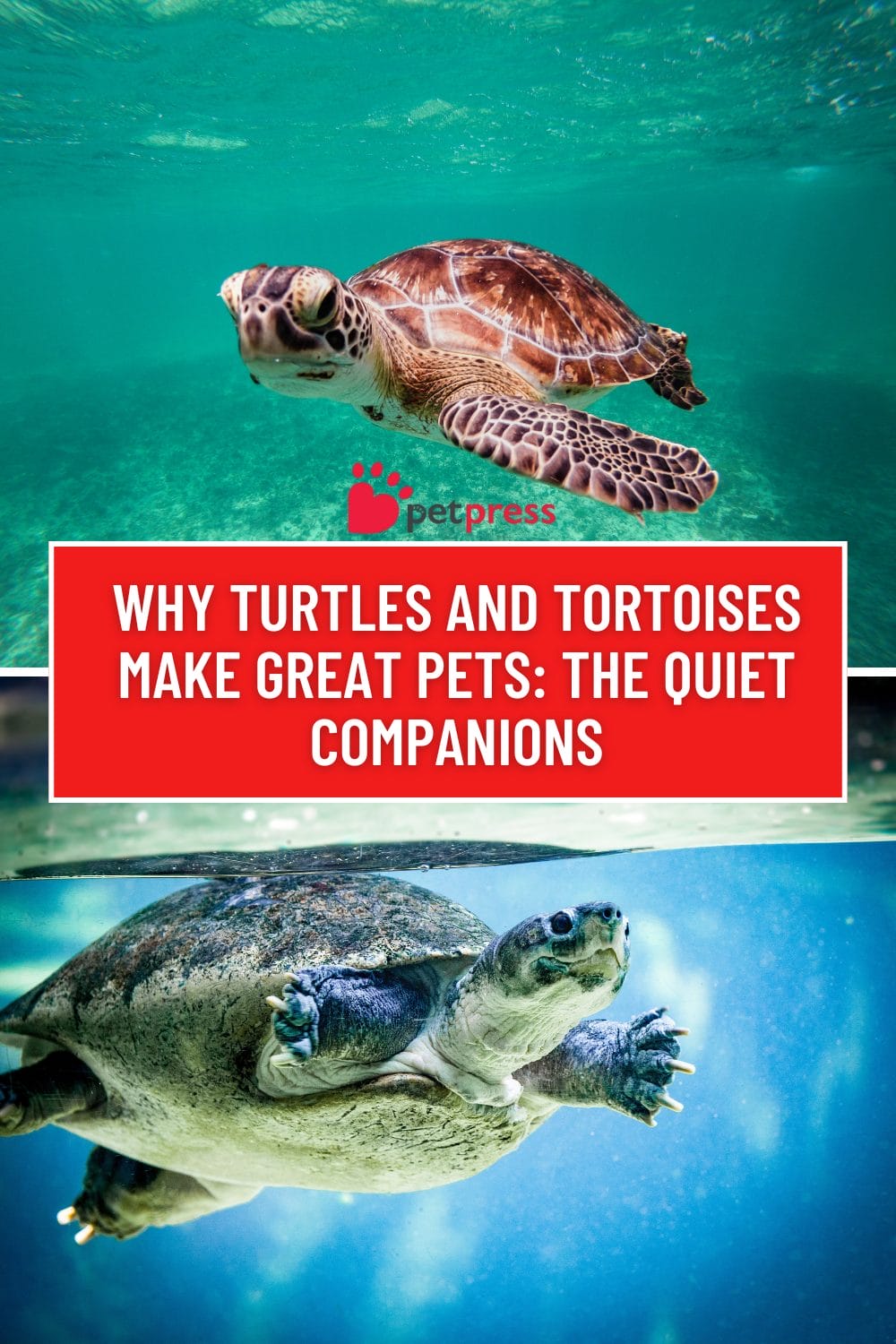
When most people think of pets, they picture dogs wagging their tails, cats purring on laps, or birds chirping in cages.
But for those looking for a low-maintenance pet, quiet companion, or simply something different, turtles and tortoises are gaining popularity.
These calm, gentle creatures offer a unique kind of companionship that is both peaceful and rewarding.
In this blog, we’ll explore why turtles and tortoises make great pets, how to care for them, and what makes them the perfect match for many lifestyles—from busy professionals to families with kids.
Turtles vs. Tortoises: What’s the Difference?
Before diving in, it’s essential to understand the difference between turtles and tortoises:
- Turtles are aquatic or semi-aquatic and spend a lot of time in the water. They have webbed feet or flippers for swimming.
- Tortoises, on the other hand, are land-dwellers with rounded, dome-shaped shells and sturdy legs built for walking.
Both can be wonderful pets, but their habitat needs and daily care routines differ significantly.

Why Choose a Turtle or Tortoise as a Pet?
Low-Maintenance Pet Option
Unlike dogs or cats, turtles and tortoises don’t require constant attention, walks, or social stimulation. They’re independent animals that thrive with minimal handling. This makes them ideal for:
- People with busy schedules
- Apartment dwellers
- First-time pet owners
- Kids under parental supervision
Their low-maintenance lifestyle is one of the top reasons people search for “easy pets to care for.”
Long Lifespan
One of the most fascinating facts is their longevity. Some species of tortoises can live over 100 years, and many turtles live for several decades.
This makes them lifelong companions—perfect for those seeking a lasting bond.
Hypoallergenic Pets
For families with allergies, turtles and tortoises are a great choice. They don’t shed fur or produce dander, making them one of the best pets for allergy sufferers.
Quiet and Peaceful
As the title suggests, these pets are the quietest companions. You’ll never deal with barking, meowing, or chirping.
Their slow, deliberate movements and silent presence can be surprisingly calming—almost meditative.
Educational for Kids
For young learners, turtles and tortoises offer a fun, hands-on way to explore biology, animal care, and responsibility. Their unique behavior and gentle nature make them excellent teaching tools.

Caring for Turtles and Tortoises: What You Need to Know
While low maintenance, turtles and tortoises do have specific care requirements that should be met for them to thrive.
Habitat Setup
- Turtles need a turtle tank setup with both water and dry basking areas. A strong filter, UVB lighting, and a heater are essential.
- Tortoises need a dry tortoise enclosure with plenty of space to walk, dig, and bask under a heat lamp.
Pro Tip: Use a UVB light for reptiles to ensure proper shell and bone development.
Dietary Needs
These pets are herbivores or omnivores, depending on the species.
- Turtles may eat insects, pellets, leafy greens, and aquatic plants.
- Tortoises mostly eat a diet rich in vegetables, grasses, and fruits.
Avoid feeding them pet food meant for other animals—it’s important to stick with species-appropriate diets.
Cleanliness and Health
- Regular cleaning of the tank or enclosure is crucial to prevent illness.
- Watch for signs of shell rot, respiratory infections, or lack of appetite.
- Annual checkups with a reptile vet are recommended.
Personality and Bonding
Turtles and tortoises might not cuddle like a cat or fetch like a dog, but they can recognize their owners over time and respond to voices or feeding cues. Many tortoise owners say their pet will walk toward them when called or touched gently.
Their subtle personalities include:
- Curiosity
- Playfulness (especially in water-loving turtles)
- Awareness of routines and feeding times
Owning a tortoise as a pet can teach you patience and respect for the natural pace of life.

Environmental and Ethical Considerations
Unfortunately, not all turtles and tortoises in the pet trade are ethically sourced. To be a responsible owner:
- Buy from reputable, ethical breeders or adoption centers
- Avoid purchasing wild-caught turtles, which can disrupt ecosystems
- Ensure the species you’re considering is legal in your region
Also, releasing pet turtles into the wild is harmful to local wildlife. These pets are a lifelong commitment, not temporary curiosities.
Popular Turtle and Tortoise Species for Beginners
If you’re considering bringing one home, here are some popular beginner-friendly options:
Turtles
- Red-Eared Slider
- Painted Turtle
- Map Turtle
Tortoises
- Russian Tortoise
- Greek Tortoise
- Hermann’s Tortoise
These species are relatively easy to care for and have temperaments suited to novice reptile owners.

Conclusion: A Different Kind of Companion
Turtles and tortoises may not greet you at the door or learn tricks, but they offer something equally special: quiet companionship, gentle energy, and a bond that can last a lifetime.
As more people seek Turtles and Tortoises Make Great Pets that fit modern lifestyles, these ancient reptiles are finding their way into homes and hearts around the world.
So, if you’re searching for a low-maintenance, long-living, and hypoallergenic pet, don’t overlook the calm, enduring presence of a turtle or tortoise.
FAQs: Turtles and Tortoises as Pets
Tortoises are often better for beginners because they live on land and have simpler habitat needs compared to aquatic turtles. However, both can be great with proper research and setup.
Yes! Over time, they can recognize your voice, scent, and feeding habits. They may not show affection like mammals, but they learn to trust and feel secure around you.
Initial setup (tank/enclosure, lights, filter) can range from $100 to $300. Monthly costs are minimal, mostly food and electricity for heating and lighting.
It depends on your location and the species. Some turtles (like certain sea turtles) are protected. Always check your local exotic pet laws before purchasing.
Turtles can live 20–40 years, while some tortoises can live 80–100+ years. Be ready for a long-term commitment when adopting these pets.
- How to Celebrate a Dog’s First Birthday on a Budget: 2026 Guide - February 18, 2026
- Best Shampoo for Sensitive Skin Dog Grooming: 2026 Guide - February 12, 2026
- 40+ Aesthetic Names for White Dogs (2026 Unique & Rare List) - February 6, 2026


GIPHY App Key not set. Please check settings